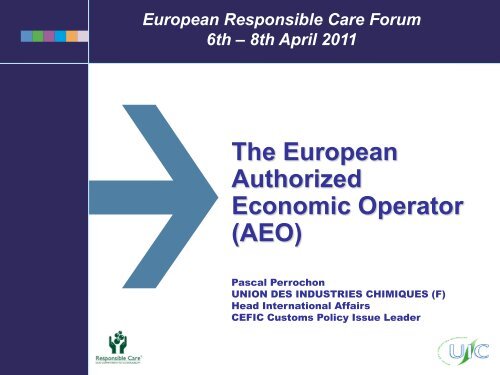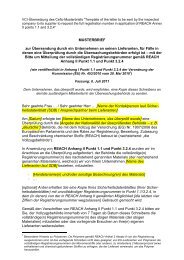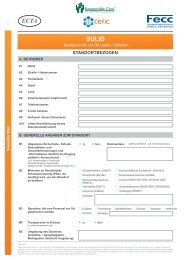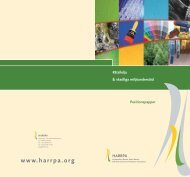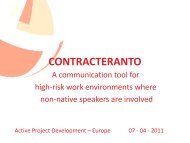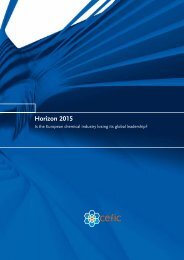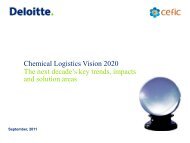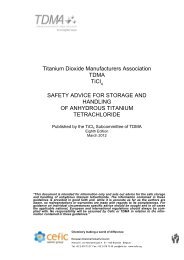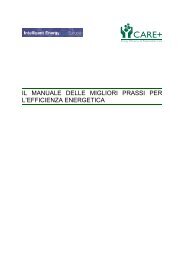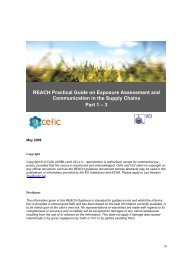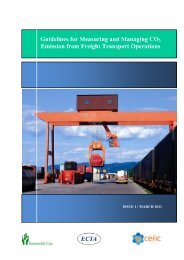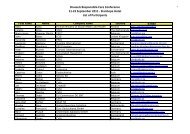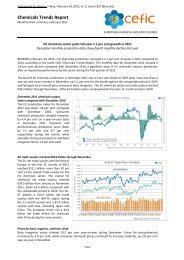Pascal Perrochon - Cefic
Pascal Perrochon - Cefic
Pascal Perrochon - Cefic
You also want an ePaper? Increase the reach of your titles
YUMPU automatically turns print PDFs into web optimized ePapers that Google loves.
European Responsible Care Forum<br />
6th – 8th April 2011<br />
The European<br />
Authorized<br />
Economic Operator<br />
(AEO)<br />
<strong>Pascal</strong> <strong>Perrochon</strong><br />
UNION DES INDUSTRIES CHIMIQUES (F)<br />
Head International Affairs<br />
CEFIC Customs Policy Issue Leader
2<br />
CONTEXT<br />
September 11 th 2001:<br />
The World Trade Center terrorist attacks<br />
2002:<br />
U.S. Container Security Initiative (C.S.I.)<br />
U.S. Customs-Trade Partnership Against Terrorism<br />
2003:<br />
The EC presented new security measures to the EP and the<br />
European Council : concept of harmonized system of risks<br />
management<br />
2005:<br />
The World Customs Organization (WCO) adopts the SAFE<br />
framework of standards for security and trade facilitation
3<br />
THE WCO INITIATIVES<br />
� June 2005 : The World Customs Organization adopts the SAFE<br />
framework of standards for security and trade facilitation<br />
� June 2006: Integration of detailed measures concerning an<br />
Authorized Economic Operator concept<br />
� The WCO objectives are :<br />
� To make the international supply chain secure<br />
� To facilitate the fair trade<br />
� The key elements of SAFE are :<br />
� Harmonization of the preliminary information of the loading<br />
declaration which must be passed on by electronic way for<br />
importation, exportation and transit,<br />
� Any country which adheres to the SAFE Framework makes a<br />
commitment to apply a coherent initiative in risks management,<br />
� The Customs administrations will offer advantages to the<br />
operators who apply the advised practices and respect the<br />
minimal standards in the security of the supply chain
4<br />
THE WCO INITIATIVES<br />
� The Authorized Economic Operator in SAFE :<br />
� An AEO will benefit from a faster treatment of the goods by<br />
the customs, with a reduction of the number of examined<br />
expeditions,<br />
� Decrease of the number of risk evaluations<br />
� Lower costs and less time for customs clearance<br />
� Reduction of the multiple and complex notification<br />
requirements<br />
� PROBLEM : AEO is not an obligation, only a recommandation
5<br />
EUROPEAN MEASURES<br />
2005: Modifications of the Community Customs Code concerning<br />
the security published in the Official Journal of the EU of May<br />
4 th :<br />
� Regulation EC n° 648/2005 of April 13th, 2005<br />
The main modifications of the Community Customs Code are:<br />
� Obligation for the operators to send information on goods to<br />
the customs authorities before any importation or any<br />
exportation from the EU:<br />
� Pre-departure or pre-arrival summary declarations<br />
� Offering a simplification of the exchanges to the reliable<br />
operators with the creation of an european Authorized<br />
Economic Operator status (AEO)<br />
� Basis of what is know referred to as the Import Control<br />
System (ICS) and the Export Control System (ECS)
6<br />
EUROPEAN MEASURES<br />
� The publication of the implementing provisions of the Community<br />
Customs Code constitutes the follow-up of the Regulation EC<br />
n°648/2005. This text settles the operational details of the<br />
customs procedures relative to the security measures,<br />
� Regulation n°1875/2006 of December 26th, 2006<br />
� Implementation dates:<br />
� 2007: a common frame of risks management is used in<br />
support of the Customs authorities control<br />
� January 1st, 2008: The AEO status came into effect.<br />
� July 1st, 2009: the operators will have to supply in advance<br />
information to the Customs authorities concerning the goods<br />
imported in the EU or exported from EU territory.<br />
� Pre-departure or pre-arrival summary declarations
7<br />
PRE-ARRIVAL / PRE-DEPARTURE<br />
DECLARATIONS<br />
� Considering the regulation EC 648/2005:<br />
“The economic operators will have to supply to the customs<br />
authorities, anticipated information on the goods entering or going<br />
out of the customs territory of the European Community.<br />
These measures will allow a better risk analysis and a faster<br />
customs clearance ; The advantages for the economic operators<br />
should be equivalent, even superiors, to the costs or to the<br />
possible disadvantages bound to the obligation to supply<br />
information”<br />
� The community texts define:<br />
� The data to be supplied in the summary declarations<br />
� The periods to supply the data<br />
� The exchange of information on risks
8<br />
PRE-ARRIVAL / PRE-DEPARTURE<br />
DECLARATIONS<br />
EU security/safety information<br />
� Pre-arrival Summary declaration :<br />
� sea transport: for the containers cargoes: at least 24<br />
hours before loading in the port of departure ;<br />
� Air transport: for Long-haul flights: at least 4 hours<br />
before the arrival at the first airport of the EU<br />
� Railroad transport: 2 hours before the arrival to the<br />
Customs office<br />
� Road transport: at least 1 hour before the arrival to the<br />
Customs office<br />
� Pre-departure Summary declaration<br />
The export customs declaration, including the required data<br />
concerning the security, will serve as pre-departure<br />
declaration, provided that the required data are strictly the<br />
same in all the member states
9<br />
THE EUROPEAN A.E.O.<br />
� To relieve the constraints of the summary declarations, the<br />
European Commission created an AEO status similar in the spirit<br />
to the U.S. C-TPAT.<br />
� This status is granted under the shape of a certification, issued by<br />
the EU Customs authorities. The advantages are situated to the<br />
security plan (AEO certificate for safety / security), to the strictly<br />
customs plan (AEO certificate for customs simplifications) or the<br />
full.<br />
� Member states can grant the AEO status to every economic<br />
operator answering common criteria concerning its security<br />
system, its financial solvency or its antecedents in respect of<br />
customs rules<br />
� Request form + self-assessment questionnaire<br />
� The AEO status granted by a Member State is supposed to be<br />
recognized by the others, but, in fact, it will not confer<br />
automatically the right to benefit from customs simplifications in<br />
those countries
10<br />
THE EUROPEAN A.E.O.<br />
� Since January 1st, 2008, the EU Customs authorities have to be<br />
capable of examining the demands formulated by the operators<br />
and of making the required audits<br />
� CEFIC always indicated in its position papers that the advantages<br />
obtained by the operators are very poor towards the constraints:<br />
� Respect for the strict standards in protection against intrusion<br />
in buildings or in logistic zones,<br />
� Commitment of the operator "to enhance reliability" of its<br />
partners<br />
� antecedents control of the employees who will occupy<br />
sensitive posts<br />
� Awareness campaign of the co-workers (with the E-learning<br />
tool)<br />
� Even if the regulation does not impose to the operators to be an<br />
AEO, later this status will become compulsory.
11<br />
Statistics today:<br />
THE EUROPEAN A.E.O.<br />
� Around 7100 operators in EU asked or are asking for an AEO<br />
certificate<br />
� Around 5100 AEO certificates had been delivered<br />
This is insufficient considering the number of operators<br />
concerned in the EU<br />
Reasons : the implementation entails a real cost for the<br />
companies in exchange for advantages that the Customs<br />
authorities have difficulties to demonstrate
12<br />
Source : the French customs administration<br />
THE EUROPEAN A.E.O.<br />
AEO requests by Member States
13<br />
THE EUROPEAN A.E.O.<br />
AEO certificates delivered by Member States<br />
Source : the French customs administration
14<br />
� CEFIC is a member of the EC Trade Contact Group for electronic<br />
customs<br />
� Since 2007, CEFIC issued AEO position papers, insisting on:<br />
� The advantages which are not attractive enough, especially for<br />
SMEs<br />
� The guarantee of an equal treatment of the economic operators in all<br />
member states to be an AEO,<br />
� The necessity of a mutual recognition with others statuses in the<br />
World, especially the U.S. C-TPAT<br />
� CEFIC strategy of lobbying:<br />
CEFIC LOBBYING ACTIONS<br />
� as an AEO, to obtain real simplifications : less control, abolition of<br />
penalties for the small malpractices, simplified access to the<br />
economic customs systems, less expensive insurance<br />
� To take into account all the corresponding regulations related to<br />
safety/security to which the chemical industry has to comply with<br />
during the AEO audit (to avoid the double checking) : Seveso risks,<br />
dual-use goods, chemical precursors,…<br />
� The promotion of an AEO status for a group
15<br />
A.E.O. and RESPONSIBLE CARE<br />
� Links between the AEO status and the European Responsible<br />
Care Security Code :<br />
� Management practices to protect people, property, products,<br />
processes, information and information systems,<br />
� Implication of the supply chain : production, storage,<br />
distribution and transportation<br />
� Risk-based approach to identify, assess and address<br />
vulnerabilities,<br />
� Responsible Care is the world’s leading voluntary industry<br />
initiative - it is run in countries whose combined chemical<br />
industries account for nearly 90% of global chemicals production.<br />
� This an opportunity to promote the mutual recognition<br />
between the European AEO status and other concepts in the<br />
World<br />
� Acquired with Norway and Switzerland<br />
� Recognition signed with Japan in June 2010 and effective<br />
coming into force at the beginning of 2011<br />
� Discussions always with the USA and China
16<br />
� Today we have no guarantee of a mutual recognition between the<br />
European status and the U.S. C-TPAT, even if the U.S. Customs<br />
and Border Protection and the EC have adopted a joint roadmap<br />
� And the “security phobia” in the United States is going on with a<br />
new step:<br />
The 100 % scanning law, which will impose in 2012 the scanning<br />
of all containers of goods exported to the United States, and not<br />
only containers with a risk (CSI).<br />
The impact of such a measure would be catastrophic for our<br />
foreign trade and would condemn automatically the AEO status.<br />
� Since July 2010, a new self-assessment questionnaire adapted to<br />
the audit<br />
� New AEO database<br />
LAST DEVELOPMENTS
17<br />
CONCLUSION<br />
� The Customs policy is of increasing strategic importance to<br />
chemical business competitiveness:<br />
� The new electronic control systems are now replacing the<br />
paper environment everywhere in the World<br />
� More clarity is required on the impact of new non-tariff<br />
measures: security/safety, counterfeiting, health and<br />
environment<br />
� All the EU companies have to modify their computer system of<br />
Customs management, integrating the new systems of their<br />
customs Administrations: Atlas in Germany, Delta in France,<br />
PLDA in Belgium, etc…<br />
� But, the security measures create new costs and supplementary<br />
delays<br />
� To be an AEO will be an obligation in the future<br />
� AEO and Responsible Care are totally complementary
18<br />
Thank you for your attention.<br />
<strong>Pascal</strong> <strong>Perrochon</strong><br />
Head International Trade, Transport & Logistics<br />
Union des Industries Chimiques<br />
Immeuble Le Diamant A - 92909 Paris La Défense – France<br />
Ph : 33.1.46.53.11.38 – Email : pperrochon@uic.fr


